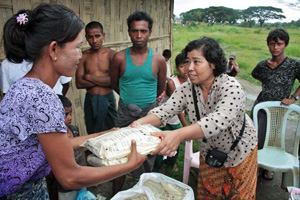Australia will provide an additional $2 million of humanitarian assistance to people fleeing violence in Rakhine State, Myanmar.
The assistance follows a visit by Australian officials to makeshift camps in Rakhine State to see the effects of the latest violence.
AusAID's Michael Hassett said conditions in locations including Myaybon, Kyaukpyu and Ramree were dire, with thousands of people, including women and children, living in fields.
'These people have a critical need for shelter, medical care, food and water, sanitation, and other essential items such as blankets,' Mr Hassett said.
'Some of these people are only accessible by boat or helicopter, making it all the more difficult for the United Nations and other agencies to assess their needs and deliver life-saving assistance.'
Australia's support will:
- help provide emergency food to around 100,000 people
- provide emergency shelter, blankets and other essential items to people who have been forced to flee their homes
- help protect children separated from their families.
Australia provided $1 million for emergency food, blankets, clothes and mosquito nets for people in temporary shelters after the initial unrest in June 2012.
United Nations and non-government organisation partners will deliver aid from the new funding. Australia and its partners are closely monitoring the situation.
United Nations reports indicate that renewed violence has forced an additional 35,000 people to leave their homes since late October, taking the total to more than 110,000 displaced. Almost 90 people have been killed and about 5,300 buildings damaged or destroyed.
Australian Foreign Minister Bob Carr has urged political and community leaders on all sides to work together to end the violence and work towards reconciliation, in accordance with the rule of law.
Australia is working with the Government of Myanmar and the international community to support a long-term solution to the Rakhine conflict and to help people rebuild their lives.
Australia has a long history of supporting people in Rakhine State to improve their access to land, support their access to finance for farmers and improve their agricultural practices.
From 2005 to 2011, AusAID supported a household livelihood project in Rakhine State, implemented by CARE, that assisted 3,200 households to establish and manage community forestry plots, helped more than 6,700 women to form savings groups and trained communities on better health practices.
Micro-loans have helped farmers establish and maintain community forestry plots, improving the productivity of crops–through supporting summer paddy production, for example–and have had a positive impact on the environment.
Women's savings groups helped members start small businesses and generate other livelihood activities, as well as raising the status of women in their households and communities.

